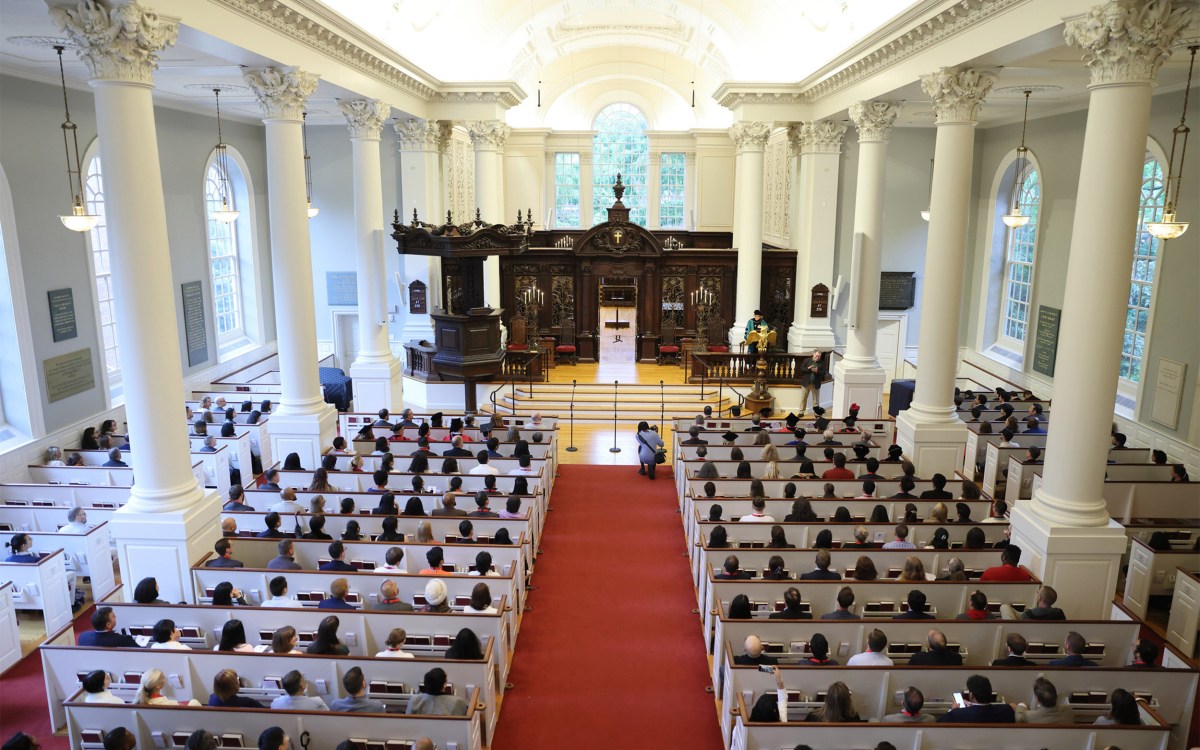Seven outstanding programs honored as innovations in U.S. government
The Ash Institute for Democratic Governance and Innovation at Harvard University’s John F. Kennedy School of Government on Sept. 25 announced seven state, city, and local government programs as winners of the 2007 Innovations in American Government Awards. The winners were honored at the Innovations in American Government Awards 20th anniversary reception at the U.S. Chamber of Commerce in Washington, D.C. Former Treasury Secretary Paul O’Neill delivered the keynote address. This event launches a yearlong 20th anniversary celebration of the Ash Institute’s Innovations in American Government Awards Program.
Many of 400 innovations honored over the program’s 20-year history are forerunners for state and federal legislation. Award-winning programs like Compstat, New York City’s crime reduction tool; Parents as Teachers, Missouri’s child development initiative; and the Program Assessment Rating Tool, the U.S. Office of Management and Budget’s federal program performance management tool, serve as harbingers of current reform strategies.
The best practices of past Innovations in American Government winners play a role in furthering academic research and public policy administration curricula at Harvard University and academic institutions worldwide. More than 450 Harvard courses and 2,246 courses worldwide incorporate the Innovations in American Government case study teaching model.
“We congratulate the 2007 Innovations in American Government and IBM award recipients as well as the nearly 200 award-winning government programs honored over the past 20 years,” said Stephen Goldsmith, director of the Innovations in American Government Program. “These programs demonstrate that government on all levels can achieve scalable solutions to pressing global issues.”
Selected by a national committee chaired by David Gergen, director of the Center for Public Leadership at the Kennedy School, the 2007 Innovations in American Government winners were acknowledged from a pool of nearly 1,000 applicants as exemplary models of innovative programming that offer demonstrable benefits to citizens nationwide and have strong potential for replication across the country.
The global recipient of the special $100,000 IBM Award in Transforming Government was also announced. Recognized as a pre-eminent transformative government initiative in operation worldwide, Singapore’s Institute of Technical Education was selected from more than 100 applicants representing over 30 countries and all levels of government.
“The Ash Institute at Harvard’s Kennedy School of Government is deeply committed to furthering the creative ideas and achievements of Innovations in American Government winners on a global scale,” said Gowher Rizvi, director of institute. “Thanks to the support of the Ford Foundation as well as the Annie E. Casey Foundation, Fannie Mae Foundation, and IBM, the Innovations in American Government Program is not only elevating the profile of government achievements worldwide, it is at the forefront of academic research on how innovative programs can transform the public sector.”
The seven 2007 Innovations in American Government Award winners follow:
- Automated Community Connection to Economic Self-Sufficiency (ACCESS), state of Florida
Florida redesigned and modernized its process for determining eligibility for public assistance. The ACCESS Florida model is streamlined, cost efficient, and nationally recognized for excellence. - Citizen and Law Enforcement Analysis and Reporting (CLEAR), city of Chicago
CLEAR is the enterprise information system for the Chicago Police Department and one of the most sophisticated information systems in the nation. - Climate Protection Initiative, city of Seattle
The Climate Protection Initiative accelerates climate protection action citywide and in hundreds of other cities, catalyzing grassroots action around the country and promoting essential state and federal policy changes. - Community Care, state of North Carolina
Community Care is a physician-led Medicaid managed care program of local provider networks serving 750,000 patients. The networks improve quality and access to care while saving millions of dollars. - Electronic Court Records, King County, Wash.
- Electronic Court Records gives court case file users electronic access. Scanning and e-filing have eliminated paper files, resulting in faster processing, desktop access to documents, and better security.
- Overt Drug Market Strategy, city of High Point, N.C.
The Overt Drug Market Strategy is a law enforcement/community partnership that collapses drug markets, reduces violence by directly engaging dealers and their families, creates predictable sanctions, and offers a range of services. - Urban Land Reform Initiative, Genesee County, Mich.
The Urban Land Reform Initiative is a self-sustaining economic model that connects tax foreclosure with management and disposition of vacant and abandoned property to stabilize neighborhoods and improve the value of urban land.
The IBM Award in Transforming Government winner follows:
Share this article
- Institute of Technical Education, Singapore
Formerly a last resort for low-achieving students, Singapore’s Institute of Technical Education (ITE) underwent a 10-year reform revamping curriculum, upgrading learning environments, and instating new academic requirements for current teachers.




